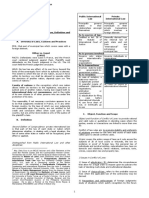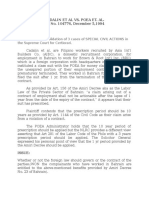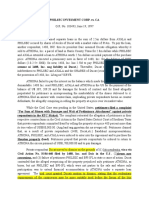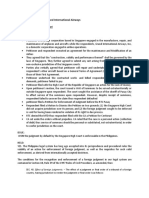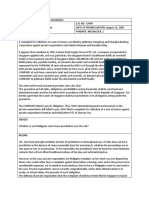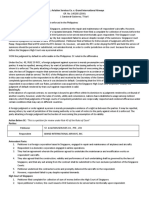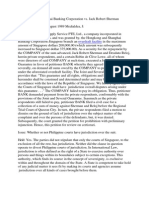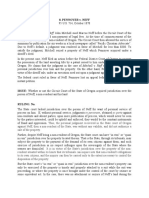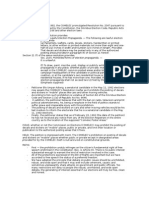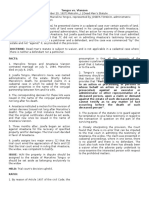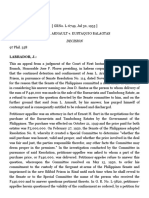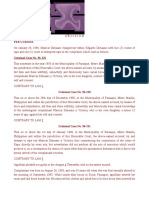Pennoyer v. Neff
Pennoyer v. Neff
Uploaded by
Sean GalvezCopyright:
Available Formats
Pennoyer v. Neff
Pennoyer v. Neff
Uploaded by
Sean GalvezOriginal Description:
Original Title
Copyright
Available Formats
Share this document
Did you find this document useful?
Is this content inappropriate?
Copyright:
Available Formats
Pennoyer v. Neff
Pennoyer v. Neff
Uploaded by
Sean GalvezCopyright:
Available Formats
DIGEST: PENNOYER V.
NEFF SUMMARY: In this case, the court held that the personal judgment recovered in the state court of Oregon against Neff was without validity, and the decision of the Court of Appeals overturning that judgment was affirmed (Neff getting back his property). Thus, when a suit is merely in personam (i.e. against a person), constructive service through publication upon a non-resident is ineffective. Also, no state can exercise direct jurisdiction and authority over persons or property without its territory. However, a state may subject property within its boundaries to the payments of its citizens, even when the land is owned by a non-resident, without infringing upon the sovereignty of the state of residency of the landowner. PETITION: an action to recover the possession of a tract of land situated in the State of Oregon. FACTS: - In this case, PENNOYER asserts title to the premises, owned by NEFF. - A judgment was rendered in favor of J. H. Mitchell, in an action brought by him (Mitchell) upon a demand for services as an attorney to Neff; that, at the time the action was commenced and the judgment rendered, the defendant (Neff) therein, the plaintiff here, was a nonresident of the State; that he was not personally served with process, and did not appear therein; and that the judgment was entered upon his default in not answering the complaint, upon a constructive service of summons by publication. - WHEN PENNOYER OBTAINED THE PROPERTY, NUFF SUED PENNOYER AND JUDGMENT WAS HELD THAT THE ORIGINAL JUDGMENT AGAINST HIM WAS INVALID FOR LACK OF PERSONAL JURISDICTION OVER BOTH HIM AND THE LAND. THE COURT FOUND THAT THE JUDGMENT IN THE LAWSUIT BETWEEN MITCHELL AND PENNOYER WAS INVALID AND THAT NEFF STILL OWNED THE LAND. THUS, PENNOYER APPEALS TO THIS COURT FOR SUCH JUDGMENT RENDERED. - It was contended in that court that the judgment in the State court against the plaintiff was void for want of personal service of process on him, or of his appearance in the action in which it was rendered and that the premises in controversy could not be subjected to the payment of the demand of a resident creditor except by a proceeding in rem, that is, by a direct proceeding against the property for that purpose. ISSUE: Can a state court exercise personal jurisdiction over a non-resident who has not been personally served while within the state and whose property within the state was not attached before the onset of litigation? HELD: No, Judgment affirmed. A court may enter a judgment against a non-resident only if the party 1) is personally served with process while within the state, or 2) has property within the state, and that property is attached before litigation begins (i.e. quasi in rem jurisdiction). RATIO: - Where a party is within a territory, he may justly be subjected to its process, and bound personally by the judgment pronounced on such process against him. - Where he is not within such territory, and is not personally subject to its laws, if, on account of his supposed or actual property being within the territory, process by
the local laws may, by attachment, go to compel his appearance, and, for his default to appear, judgment may be pronounced against him, such a judgment must, upon general principles, be deemed only to bind him to the extent of such property, and cannot have the effect of a conclusive judgment in personam, for the plain reason, that, except so far as the property is concerned, it is a judgment coram non judice. Furthermore, Jurisdiction is acquired in one of two modes: first, as against the person of the defendant by the service of process; or, secondly, by a procedure against the property of the defendant within the jurisdiction of the court. In the latter case, the defendant is not personally bound by the judgment beyond the property in question. And it is immaterial whether the proceeding against the property be by an attachment or bill in chancery. It must be substantially a proceeding in rem. If the defendant appears, the cause becomes mainly a suit in personam, with the added incident that the property attached remains liable, under the control of the court, to answer to any demand which may be established against the defendant by the final judgment of the court. But if there is no appearance of the defendant, and no service of process on him, the case becomes in its essential nature a proceeding in rem, the only effect of which is to subject the property attached to the payment of the demand which the court may find to be due to the plaintiff. In other words, service may answer in all actions which are substantially proceedings in rem. But where the entire object of the action is to determine the personal rights and obligations of the defendants, that is, where the suit is merely in personam, constructive service in this form upon a nonresident is ineffectual for any purpose. THUS - NO PERSON IS REQUIRED TO ANSWER IN A SUIT ON WHOM PROCESS HAS NOT BEEN SERVED, OR WHOSE PROPERTY HAS NOT BEEN ATTACHED. IN THIS CASE, THERE WAS NO PERSONAL NOTICE, NOR AN ATTACHMENT OR OTHER PROCEEDING AGAINST THE LAND, UNTIL AFTER THE JUDGMENTS. THE JUDGMENTS, THEREFORE, ARE NULLITIES, AND DID NOT AUTHORIZE THE EXECUTIONS ON WHICH THE LAND WAS SOLD. Since the adoption of the Fourteenth Amendment to the Federal Constitution, the validity of such judgments may be directly questioned, and their enforcement in the State resisted, on the ground that proceedings in a court of justice to determine the personal rights and obligations of parties over whom that court has no jurisdiction do not constitute due process of law. In action in rem, "due process of law would require appearance or personal service before the defendant could be personally bound by any judgment rendered." THUS - IT FOLLOWS FROM THE VIEWS EXPRESSED THAT THE PERSONAL JUDGMENT RECOVERED IN THE STATE COURT OF OREGON AGAINST THE PLAINTIFF HEREIN, THEN A NONRESIDENT OF THE STATE, WAS WITHOUT ANY VALIDITY, AND DID NOT AUTHORIZE A SALE OF THE PROPERTY IN CONTROVERSY.
NOTES: PRINCIPLES OF PRIVATE INTERNATIONAL LAW - Every State has the power to determine for itself the civil status and capacities of its inhabitants; to prescribe the subjects upon which they may contract, the forms and solemnities with which their contracts shall be executed, the rights and obligations arising from them, and the mode in which their validity shall be determined and their obligations enforced; and also the regulate the manner
and conditions upon which property situated within such territory, both personal and real, may be acquired, enjoyed, and transferred. The laws of one State have no operation outside of its territory except so far as is allowed by comity, and that no tribunal established by it can extend its process beyond that territory so as to subject either persons or property to its decisions.
You might also like
- CASE DIGEST - CONFLICT OF LAWS Raytheon International Vs Rouzie GR 162894100% (1)CASE DIGEST - CONFLICT OF LAWS Raytheon International Vs Rouzie GR 1628942 pages
- Triple Eight Integrated Services, Inc. vs. NLRC.No ratings yetTriple Eight Integrated Services, Inc. vs. NLRC.1 page
- Kelly Bingham - Final Report and RecommendationNo ratings yetKelly Bingham - Final Report and Recommendation14 pages
- 18 Continental Micronesia, Inc. v. Basso - DIGEST100% (1)18 Continental Micronesia, Inc. v. Basso - DIGEST3 pages
- ST Aviation Services Vs Grand International AirwaysNo ratings yetST Aviation Services Vs Grand International Airways2 pages
- 13 Mullane V Central Hanover Bank & TrustNo ratings yet13 Mullane V Central Hanover Bank & Trust3 pages
- St. Aviation v. Grand International Air DigestNo ratings yetSt. Aviation v. Grand International Air Digest3 pages
- L. Norse Management Co. (PTE) vs. National Seamen Board100% (2)L. Norse Management Co. (PTE) vs. National Seamen Board2 pages
- WILLIAM F. GEMPERLE v. HELEN SCHENKER, GR No. L-18164100% (1)WILLIAM F. GEMPERLE v. HELEN SCHENKER, GR No. L-181641 page
- Bank of America NT&SA vs. Court of Appeals PDFNo ratings yetBank of America NT&SA vs. Court of Appeals PDF3 pages
- FILIPINAS COMPAÑIA DE SEGUROS v. HUENEFELDNo ratings yetFILIPINAS COMPAÑIA DE SEGUROS v. HUENEFELD2 pages
- Baliwag Transit Corporation Vs CA G.R No 80447 (Carriage of Passengers)No ratings yetBaliwag Transit Corporation Vs CA G.R No 80447 (Carriage of Passengers)1 page
- Pitzer College vs. Indian Harbor Insurance CompanyNo ratings yetPitzer College vs. Indian Harbor Insurance Company8 pages
- Saudi Arabian Airlines vs. CA G.R. No. 122191, October 8, 1998No ratings yetSaudi Arabian Airlines vs. CA G.R. No. 122191, October 8, 19981 page
- Yu Kian Chie vs. Republic of The Philippines Facts:: Was Able To Prove That He Has A Lucrative IncomeNo ratings yetYu Kian Chie vs. Republic of The Philippines Facts:: Was Able To Prove That He Has A Lucrative Income1 page
- Gulf Oil Corp v. Gilbert (Forum Non Conveniens)No ratings yetGulf Oil Corp v. Gilbert (Forum Non Conveniens)3 pages
- Perkins vs. Benguet Consolidated Mining Case DigestNo ratings yetPerkins vs. Benguet Consolidated Mining Case Digest1 page
- Conflict of Laws in Intellectual Property Laws Report100% (1)Conflict of Laws in Intellectual Property Laws Report29 pages
- Pennoyer v. Neff 95 U.S. 714 Rule:: SyllabusNo ratings yetPennoyer v. Neff 95 U.S. 714 Rule:: Syllabus11 pages
- in Re - Testate Estate of The Late Gregorio VenturaNo ratings yetin Re - Testate Estate of The Late Gregorio Ventura2 pages
- Benny Sampilo and Honorato Salacup v. CANo ratings yetBenny Sampilo and Honorato Salacup v. CA3 pages
- In The Matter For The Declaration of William GueNo ratings yetIn The Matter For The Declaration of William Gue2 pages
- Ermita Motel Association V Mayor of ManilaNo ratings yetErmita Motel Association V Mayor of Manila5 pages
- Vindictive Prosecution Marietta Parker and Terra D Morehead, Eric Melgren of KansasNo ratings yetVindictive Prosecution Marietta Parker and Terra D Morehead, Eric Melgren of Kansas17 pages
- Civil Procedure Code: Discovery, Inspection and Production of DocumentsNo ratings yetCivil Procedure Code: Discovery, Inspection and Production of Documents11 pages
- Plaintiffs' Written Submissions: in The High Court of South Africa Gauteng Division, PretoriaNo ratings yetPlaintiffs' Written Submissions: in The High Court of South Africa Gauteng Division, Pretoria8 pages
- N The Nternational Ourt of Ustice: C C E INo ratings yetN The Nternational Ourt of Ustice: C C E I61 pages
- People of The Philippines, Appellee, EDGARDO DIMAANO, AppellantNo ratings yetPeople of The Philippines, Appellee, EDGARDO DIMAANO, Appellant207 pages
- 2021-09-24 Upstream Addicks - Doc 397 Motion For Class Certification0% (1)2021-09-24 Upstream Addicks - Doc 397 Motion For Class Certification46 pages
- B11 Executive Digest - Central Visayas vs. Adlawan100% (1)B11 Executive Digest - Central Visayas vs. Adlawan2 pages
- Aboitiz Transport System Corp vs. Carlos A. Gothong Lines, Inc.No ratings yetAboitiz Transport System Corp vs. Carlos A. Gothong Lines, Inc.6 pages
